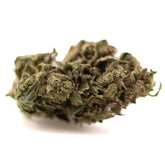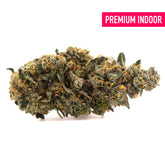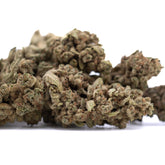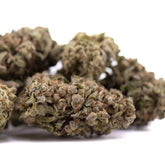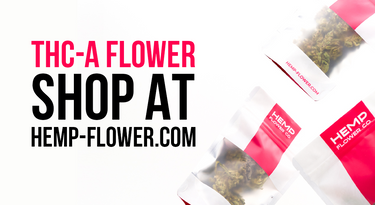THCA Concentrate Effects: What to Expect and How It Works
The cannabis concentrate market has exploded with innovation, and THCA concentrates represent one of the most intriguing developments in recent years. Understanding THCA concentrate effects is crucial for anyone considering these potent products, whether you're a seasoned cannabis user or exploring concentrates for the first time.
Unlike traditional THC products, THCA concentrates exist in a unique space that bridges non-psychoactive therapeutic potential with powerful psychoactive effects when activated. This comprehensive guide will walk you through everything you need to know about what does THCA concentrate do, how it affects your body, and what you can realistically expect from your experience.

Understanding THCA: The Foundation of Cannabis Effects
Tetrahydrocannabinolic acid (THCA) serves as the precursor to THC, the compound responsible for cannabis's psychoactive effects. In its raw, unheated form, THCA doesn't produce the "high" associated with cannabis consumption. This fundamental difference shapes how THCA concentrate effects manifest depending on how you consume the product.
When cannabis plants grow, they produce THCA rather than THC directly. The conversion from THCA to THC occurs through decarboxylation, a process triggered by heat, light, or time. This scientific reality means that THCA concentrates can offer two distinctly different experiences depending on how you use them.
The molecular structure of THCA includes an extra carboxyl group that prevents it from binding effectively to CB1 receptors in your brain. This structural difference explains why raw THCA doesn't produce psychoactive effects, while also contributing to its unique therapeutic potential.
Raw THCA Effects: Non-Psychoactive Benefits
When consumed without heat activation, THCA effects focus primarily on potential therapeutic benefits rather than psychoactive experiences. Research into raw THCA suggests several promising areas of effect, though it's important to note that studies remain limited and preliminary.
Potential Anti-Inflammatory Properties
Raw THCA demonstrates potential anti-inflammatory effects in preliminary research. Users consuming raw THCA concentrates through methods like cold-pressed juicing or low-temperature consumption report experiences that may align with these anti-inflammatory properties, though individual results vary significantly.
Neuroprotective Potential
Early research suggests THCA might offer neuroprotective benefits. While human studies remain limited, animal research indicates potential applications for neurodegenerative conditions. However, consumers should understand that these effects require much more research before making definitive claims about therapeutic benefits.
Digestive System Interactions
Some users report that raw THCA consumption affects their digestive comfort, potentially relating to its interaction with the endocannabinoid system. The exact mechanisms remain under investigation, but anecdotal reports suggest possible benefits for digestive wellness when THCA is consumed in its raw form.
Important Research Limitations
Current research into raw THCA effects remains in early stages. Most studies involve animal models or cell cultures rather than human trials. Consumers should approach claims about therapeutic benefits with appropriate caution, understanding that definitive medical benefits haven't been established through rigorous clinical trials.

Activated THCA Effects: The Psychoactive Experience
The THCA concentrate high emerges when decarboxylation converts THCA into THC through heat application. This transformation fundamentally changes the compound's effects, creating the psychoactive experience most people associate with cannabis concentrates.
Decarboxylation During Consumption
When you dab, vape, or smoke THCA concentrates, the heat instantly converts THCA to THC. This real-time conversion means you're essentially consuming THC, which explains why the effects mirror traditional THC concentrate experiences.
The decarboxylation temperature threshold sits around 220°F (104°C), though the process accelerates significantly at higher temperatures. Most consumption methods easily exceed this threshold, ensuring complete or near-complete THCA conversion.
Psychoactive Onset and Characteristics
How does THCA concentrate make you feel once activated? The experience closely resembles high-potency THC concentrates, with some users reporting subtle differences in effect quality or duration. The psychoactive effects typically include:
Cerebral Effects: Enhanced creativity, altered perception, mood elevation, and cognitive shifts characteristic of THC consumption. The intensity depends heavily on dosage, individual tolerance, and consumption method.
Physical Sensations: Body relaxation, potential sedation at higher doses, altered sensory perception, and the classic physical sensations associated with THC consumption.
Euphoric Response: The characteristic cannabis "high" including mood enhancement, giggles, increased appetite, and social effects that many users seek from THC products.
Potency Considerations
THCA concentrates often contain extremely high concentrations of cannabinoids, sometimes exceeding 90% purity. When converted to THC, this translates to incredibly potent psychoactive effects that can overwhelm inexperienced users or those accustomed to flower consumption.
Consumption Method Impact on THCA Concentrate Effects
The method you choose for consuming THCA concentrates dramatically influences both the intensity and character of your experience. Each consumption method offers distinct advantages and produces different effect profiles.
Dabbing: Maximum Intensity and Speed
Dabbing represents the most popular method for THCA concentrate consumption, delivering rapid onset and intense effects. The high temperatures involved (typically 500-800°F) ensure complete decarboxylation and maximum bioavailability.
Effect Characteristics: Dabbing produces the most intense THCA concentrate effects, with onset occurring within seconds to minutes. The experience peaks quickly and tends to be shorter in duration but more intense than other methods.
Temperature Variables: Lower temperature dabs (around 500-600°F) may preserve more terpenes and produce smoother effects, while higher temperatures create more intense but potentially harsher experiences.
Vaping: Controlled Temperature Experience
Vaping THCA concentrates allows for temperature control, potentially affecting the quality and intensity of effects. Different vaping temperatures can influence which compounds vaporize and how the experience unfolds.
Effect Characteristics: Vaping typically produces smoother onset and potentially longer-lasting effects compared to dabbing. The lower temperatures may preserve terpenes that contribute to the overall experience.
Temperature Control Benefits: Users can experiment with different temperature ranges to find their preferred balance of effect intensity, smoothness, and duration.
Edible Consumption: Extended Duration Effects
When THCA concentrates are properly decarboxylated and incorporated into edibles, they produce effects similar to traditional THC edibles but potentially more intense due to concentration levels.
Effect Characteristics: Edible consumption creates longer-lasting effects with delayed onset, typically taking 30 minutes to 2 hours to manifest fully. The experience can last 4-8 hours or longer.
Bioavailability Differences: Oral consumption results in first-pass liver metabolism, potentially creating different metabolites and effect profiles compared to inhalation methods.

Timeline of THCA Concentrate Effects
Understanding THCA concentrate effects duration helps users plan their experiences and avoid overconsumption. The timeline varies significantly based on consumption method, dosage, and individual factors.
Inhalation Methods Timeline
Onset: Effects typically begin within seconds to minutes of consumption when using dabbing or vaping methods. The rapid onset occurs because cannabinoids enter the bloodstream directly through lung tissue.
Peak Effects: Maximum intensity usually occurs within 10-30 minutes of consumption, depending on the specific method and individual metabolism. Peak effects represent the highest concentration of active compounds in your system.
Duration: Total effect duration for inhalation methods typically ranges from 1-4 hours, with most users experiencing significant effects for 2-3 hours. Individual variation can be substantial.
Comedown: The decline phase usually occurs gradually over 1-2 hours as cannabinoid levels decrease in your system.
Edible Methods Timeline
Onset: Edible forms require 30 minutes to 2 hours for noticeable effects, depending on stomach contents, metabolism, and individual factors. The delayed onset often leads to overconsumption mistakes.
Peak Effects: Maximum intensity typically occurs 2-4 hours after consumption, significantly later than inhalation methods. This delayed peak can surprise inexperienced users.
Duration: Total effects can last 6-12 hours, with some users reporting residual effects lasting even longer. The extended duration makes dosage control crucial.
Comedown: The decline phase for edibles often extends over several hours, with gradual reduction in effect intensity.
Dosage Considerations for THCA Concentrates
Proper dosing represents one of the most critical factors in achieving desired THCA concentrate effects while avoiding negative experiences. The extreme potency of these products demands careful attention to dosage guidelines.
Starting Dose Recommendations
Inexperienced Users: Begin with extremely small amounts, often described as "rice grain" sized portions. For dabbing, this might represent 0.01-0.02 grams. New users should prioritize safety over effect intensity.
Experienced Cannabis Users: Even those familiar with cannabis flower should start conservatively with concentrates. A starting dose of 0.02-0.05 grams allows for gauging individual response without overwhelming effects.
Experienced Concentrate Users: Those familiar with other concentrates can start with slightly larger amounts but should still exercise caution with new THCA concentrate products due to potency variations.
Tolerance Factors
Cannabis tolerance significantly affects what does THCA concentrate do for individual users. Regular cannabis users typically require larger doses to achieve desired effects, but concentrate potency can still surprise experienced users.
Tolerance Development: Regular THCA concentrate use can lead to tolerance development, requiring larger doses over time to achieve similar effects. Users should consider occasional tolerance breaks to maintain effectiveness.
Cross-Tolerance: Tolerance to other THC products translates to THCA concentrates since they convert to the same active compound. However, the high potency of concentrates can still produce stronger effects than users expect.
Potency Variables
THCA concentrate potency varies significantly between products, strains, and manufacturers. Testing results provide guidance, but individual batches may vary from listed percentages.
Laboratory Testing: Reputable products include third-party laboratory testing results showing exact cannabinoid percentages. These results help users calculate appropriate dosages more accurately.
Strain Variations: Different strains produce different effect profiles even at similar potency levels due to varying terpene profiles and minor cannabinoid content.

Individual Variations in THCA Concentrate Effects
How does THCA concentrate make you feel depends heavily on individual factors that influence cannabinoid metabolism and sensitivity. Understanding these variables helps users set realistic expectations and optimize their experiences.
Body Weight and Metabolism
Larger individuals typically require higher doses to achieve similar effects, though the relationship isn't perfectly linear. Metabolism speed affects both onset timing and effect duration, with faster metabolisms generally processing cannabinoids more quickly.
Metabolic Factors: Individual differences in liver enzyme activity, particularly CYP2C9 and CYP3A4, influence how quickly your body processes cannabinoids. These genetic variations can significantly affect both intensity and duration of effects.
Body Composition: Fat tissue stores cannabinoids, potentially affecting both onset and duration of effects. Individuals with higher body fat percentages might experience different effect profiles compared to leaner users.
Experience Level and Expectations
Previous cannabis experience significantly influences how users perceive and respond to THCA concentrate effects. Experienced users often better recognize onset, manage effects, and avoid overconsumption.
Set and Setting: Your mental state and environment during consumption heavily influence the quality of your experience. Positive expectations and comfortable settings typically enhance enjoyment while reducing anxiety risks.
Preparation and Knowledge: Understanding what to expect helps users have more positive experiences. Knowledge about onset timing, effect duration, and management techniques contributes to better outcomes.
Genetic Factors
Genetic variations in cannabinoid receptors and metabolic enzymes create significant individual differences in cannabis response. Some people naturally process cannabinoids more efficiently or have different receptor sensitivity levels.
Endocannabinoid System Variations: Individual differences in CB1 and CB2 receptor density and sensitivity affect how strongly users respond to cannabinoids. These genetic factors contribute to the wide range of individual responses to similar doses.
Potential Side Effects and Risks
While many users enjoy positive THCA concentrate benefits, it's important to understand potential negative effects and how to minimize risks. The high potency of concentrates can amplify both desired and unwanted effects.
Overconsumption Risks
The extreme potency of THCA concentrates makes overconsumption a significant concern. Taking too much can result in intensely uncomfortable experiences that last several hours.
Anxiety and Paranoia: High doses can trigger anxiety, panic attacks, or paranoid thoughts, particularly in sensitive users or those consuming in stressful environments. These psychological effects can be intense and distressing.
Physical Discomfort: Overconsumption may cause dizziness, nausea, rapid heart rate, or excessive sedation. While these effects aren't typically dangerous, they can be very uncomfortable.
Cognitive Impairment: High doses can significantly impair cognitive function, affecting decision-making, memory, and coordination. Users should avoid driving or operating machinery during and after consumption.
Common Side Effects
Even appropriate doses can produce side effects that users should anticipate and prepare for.
Dry Mouth and Eyes: These classic cannabis side effects occur frequently with THCA concentrates. Staying hydrated and having eye drops available can help manage these symptoms.
Increased Appetite: The "munchies" effect is common and can be intense with concentrates. Having healthy snacks available prevents poor food choices during effects.
Altered Time Perception: Cannabis commonly affects time perception, making minutes feel like hours. Understanding this effect helps users avoid anxiety about duration.
Risk Mitigation Strategies
Start Low, Go Slow: This fundamental principle becomes even more critical with concentrates. Begin with minimal doses and wait adequately between consumption sessions.
Safe Environment: Consume in comfortable, safe environments with trusted people who can provide support if needed.
Avoid Mixing: Don't combine THCA concentrates with alcohol or other substances, as interactions can be unpredictable and potentially dangerous.
Have Support Available: Ensure someone sober is available in case assistance becomes necessary during your experience.
THCA Concentrate Effects: Strain-Specific Considerations
Different cannabis strains produce varying effects even when processed into THCA concentrates. Understanding these differences helps users select products aligned with their desired outcomes.
Indica-Dominant Concentrates
Indica-dominant THCA concentrates typically produce more relaxing, sedating effects. Users often report increased body relaxation, stress relief, and potential sleep aid benefits.
Effect Characteristics: Heavier body effects, increased relaxation, potential couch-lock at higher doses, and enhanced appetite stimulation. These concentrates work well for evening use or when deep relaxation is desired.
Terpene Profiles: Indica strains often contain higher levels of myrcene, linalool, and other terpenes associated with relaxing effects. These compounds contribute to the overall experience beyond just THC content.
Sativa-Dominant Concentrates
Sativa-dominant varieties typically produce more energizing, cerebral effects that many users prefer for daytime consumption or creative activities.
Effect Characteristics: Enhanced creativity, increased energy, social enhancement, and mood elevation. These effects make sativa concentrates popular for social situations or productive activities.
Activity Compatibility: Sativa-dominant concentrates often pair well with creative endeavors, social activities, or situations where mental stimulation is desired rather than sedation.
Hybrid Concentrates
Hybrid strains offer balanced effects combining elements of both indica and sativa characteristics. The specific balance depends on the particular strain's genetics and can vary significantly.
Balanced Effects: Hybrids can provide both mental stimulation and physical relaxation, making them versatile options for various situations and times of day.
Customized Experiences: The wide variety of hybrid genetics allows users to find specific effect profiles that match their preferences and needs.
Maximizing Positive THCA Concentrate Effects
Getting the most beneficial experience from THCA concentrate effects involves preparation, proper technique, and understanding your individual response patterns.
Preparation Strategies
Hydration: Begin your session well-hydrated and maintain fluid intake throughout the experience. Dehydration can worsen side effects and reduce enjoyment.
Nutrition: Having food available prevents blood sugar drops that can worsen negative effects. Light, easily digestible snacks work best during cannabis experiences.
Environment: Create a comfortable, safe space where you can relax without concerns about interruption or judgment. Comfortable seating, appropriate lighting, and entertainment options enhance the experience.
Consumption Techniques
Proper Equipment: Use appropriate tools for your chosen consumption method. Quality dab rigs, vaporizers, or other equipment improve both safety and effect quality.
Temperature Control: When possible, control consumption temperatures to optimize both effect quality and smoothness. Lower temperatures often provide better terpene preservation and smoother experiences.
Timing Considerations: Plan consumption when you have adequate time to experience full effects without time pressure or responsibilities. Rushing or worrying about timing can negatively impact your experience.
Enhancement Strategies
Terpene Awareness: Understanding terpene profiles helps select products aligned with desired effects. Different terpenes contribute unique characteristics to the overall experience.
Activity Pairing: Match your chosen concentrate type with appropriate activities. Relaxing strains pair well with movies or meditation, while energizing varieties complement creative projects or social activities.
Mindful Consumption: Pay attention to your body's responses and adjust accordingly. Mindful awareness helps optimize dosing and timing for future sessions.
Legal Considerations and Safety
Understanding the legal status of THCA concentrate benefits in your area is crucial for safe and legal consumption. Laws vary significantly by jurisdiction and continue evolving.
Legal Status Variations
THCA concentrates exist in a complex legal landscape. While THCA itself isn't psychoactive, its easy conversion to THC complicates legal classifications in many jurisdictions.
Federal Considerations: Federal law classifications may not clearly address THCA specifically, creating potential legal ambiguities that users should understand.
State and Local Laws: Individual states and localities may have specific regulations governing THCA products. Research your local laws before purchasing or consuming these products.
Transportation Concerns: Moving THCA concentrates across state lines or jurisdictional boundaries can create legal complications even where possession is legal.
Safety Guidelines
Product Quality: Purchase from reputable sources that provide third-party testing results. Quality products reduce risks and provide more predictable effects.
Storage Safety: Store concentrates safely away from children, pets, and unauthorized users. Proper storage also maintains product quality and potency.
Consumption Responsibility: Never drive or operate machinery while under the influence. Plan transportation arrangements before consumption begins.
Frequently Asked Questions
How long do THCA concentrate effects last?
THCA concentrate effects duration varies significantly based on consumption method. Inhalation methods typically last 2-4 hours, while edible forms can extend effects for 6-12 hours. Individual factors like metabolism, dosage, and tolerance influence duration.
What's the difference between THCA and THC concentrates?
THCA concentrates contain the acid precursor to THC, which converts to THC when heated. Raw THCA isn't psychoactive, while heated THCA produces effects identical to THC concentrates due to decarboxylation during consumption.
Can you consume THCA concentrates without getting high?
Yes, consuming raw THCA without heat application won't produce psychoactive effects. However, most consumption methods involve heat, which converts THCA to psychoactive THC. Cold consumption methods maintain non-psychoactive properties.
How much THCA concentrate should beginners use?
Beginners should start with extremely small amounts, typically 0.01-0.02 grams for inhalation methods. The high potency of concentrates makes conservative dosing essential for avoiding overwhelming experiences.
Do THCA concentrates show up on drug tests?
When heated and consumed, THCA converts to THC, which will appear on standard cannabis drug tests. Even raw THCA consumption might trigger positive results depending on test sensitivity and consumption amounts.
What are the main benefits of THCA concentrates?
THCA concentrate benefits include high potency for experienced users, potential therapeutic applications in raw form, versatile consumption options, and efficient delivery of cannabinoids. Benefits vary based on individual needs and consumption methods.
How does tolerance affect THCA concentrate effects?
Cannabis tolerance directly affects THCA concentrate experiences since the active compound becomes THC. Regular users typically require larger doses, but the extreme potency of concentrates can still produce stronger effects than expected.
Are there any drug interactions with THCA concentrates?
THCA concentrates may interact with certain medications, particularly those metabolized by liver enzymes CYP2C9 and CYP3A4. Consult healthcare providers before combining with prescription medications.
Can THCA concentrates cause anxiety?
High doses of activated THCA (converted to THC) can trigger anxiety, especially in sensitive users. Starting with small doses, consuming in comfortable environments, and understanding individual tolerance helps minimize anxiety risks.
What's the best consumption method for THCA concentrates?
The best method depends on individual preferences and desired effects. Dabbing provides rapid onset and intense effects, vaping offers temperature control, and edibles create longer-lasting experiences. New users should start with vaping or low-temperature dabbing for better control.
Conclusion: Navigating Your THCA Concentrate Journey
Understanding THCA concentrate effects empowers users to make informed decisions about these potent products. Whether you're interested in the potential therapeutic benefits of raw THCA or seeking the intense psychoactive experiences of activated concentrates, knowledge remains your most valuable tool.
The key to positive experiences lies in respecting the potency of THCA concentrates, starting with conservative doses, and understanding how different consumption methods affect your individual response. Remember that what does THCA concentrate do for one person may differ significantly for another based on tolerance, metabolism, and personal preferences.
As research into THCA continues evolving, we may discover additional therapeutic applications and better understand optimal consumption protocols. For now, focus on safe, legal consumption practices that prioritize your wellbeing and enhance your cannabis experience.
How does THCA concentrate make you feel ultimately depends on your approach, preparation, and respect for these powerful products. Start low, go slow, choose quality products, and always prioritize safety in your cannabis journey. With proper knowledge and responsible use, THCA concentrates can provide valuable experiences for both therapeutic and recreational users.
The future of cannabis concentrates continues expanding, with THCA products representing an exciting intersection of potency, versatility, and potential therapeutic applications. Stay informed, consume responsibly, and enjoy exploring what these remarkable products have to offer.
